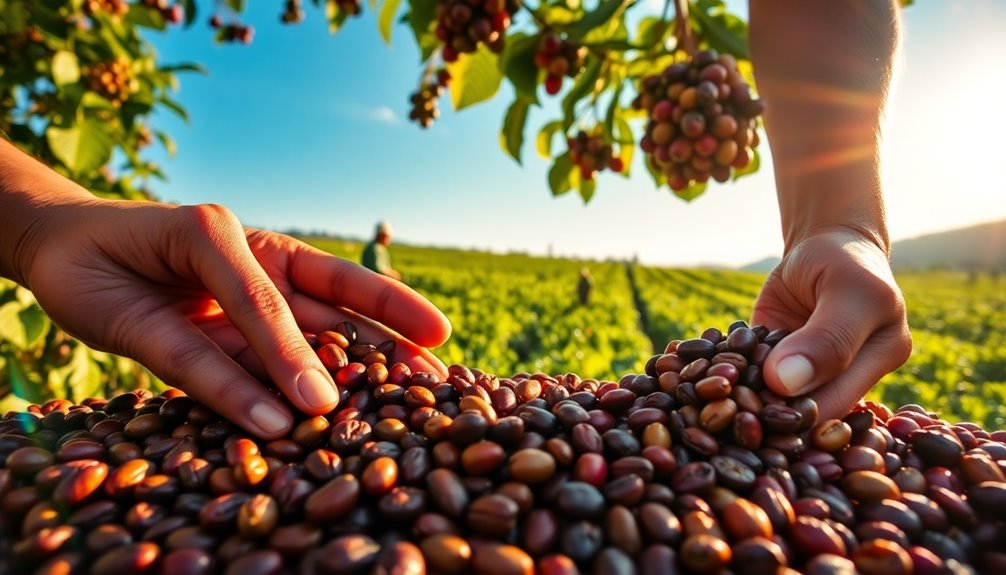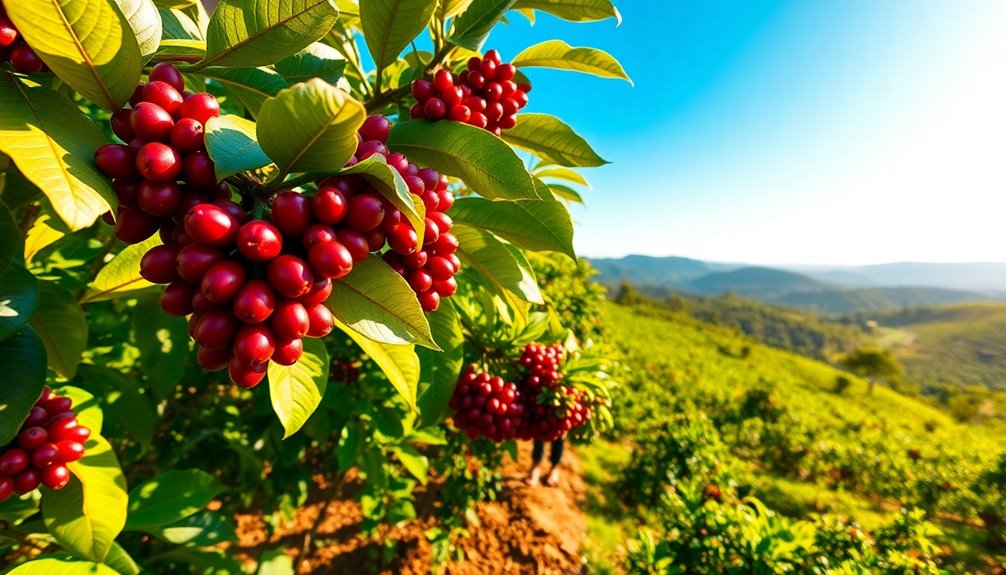Tanzanian coffee takes you on a flavorful journey from farm to cup, beginning in the lush highlands where smallholder farmers grow cherries in rich volcanic soil. After about 3-4 years, ripe cherries are handpicked and undergo two main processing methods: washed and natural. Each method highlights unique flavor profiles, with bright acidity and fruity notes like pear and strawberry. Quality control guarantees only the finest beans make it to market, enhancing Tanzania's global reputation. This dedication to flavor and quality results in a memorable coffee experience that keeps you coming back for more. There's plenty more to unpack on this journey!
Key Takeaways
- Tanzanian coffee thrives in rich volcanic soil and ideal climates, particularly in highland areas like Mount Kilimanjaro and Mbeya Highlands.
- Smallholder farmers, making up 90% of production, employ sustainable practices to cultivate and handpick ripe coffee cherries after 3-4 years.
- Two processing methods, washed and natural, enhance unique flavors, with washed providing clarity and natural offering fruity notes.
- Quality control at hulling stations ensures only the finest beans are graded and packaged for export, maintaining high standards.
- The auction system managed by the Tanzanian Coffee Board connects farmers to global markets, ensuring quality beans reach international buyers.
The Tanzanian Coffee Journey Begins

When you explore Tanzanian coffee, you quickly discover that its journey begins in lush highland areas, like Mount Kilimanjaro and the Mbeya Highlands.
The rich volcanic soil and ideal climate create a perfect environment for coffee cultivation. Smallholder farmers, who produce about 90% of Tanzanian coffee, employ sustainable farming practices to nurture their coffee trees from planting to harvesting.
After 3-4 years, the trees yield ripe coffee cherries, which are carefully handpicked to guarantee only the best quality fruit is selected. This attention to detail is essential, as it greatly impacts the flavor profile.
The two primary processing methods—washed and natural—further enhance the coffee's unique characteristics, setting the stage for an exceptional cup.
Processing Coffee: From Cherry to Bean

As you explore the processing of Tanzanian coffee, you'll find that the journey from cherry to bean is a meticulous art that greatly influences the final flavor.
Tanzanian farmers primarily use two methods: the washed process and the natural method. Each affects the flavor profiles uniquely:
- Washed Process: Involves pulping, fermenting, washing, and sun-drying beans, leading to a cleaner taste.
- Natural Method: Cherries are sun-dried immediately, resulting in fruity flavors.
- Quality Control: After processing, beans are sorted and graded, ensuring consistency and removing defects.
This careful processing defines the unique characteristics of Tanzanian coffee, showcasing the dedication of local farmers and their commitment to excellence.
Ensuring Quality Control and Grading

Ensuring quality control and grading is essential for maintaining the high standards of Tanzanian coffee, especially since these factors directly influence market value and consumer perception.
At hulling stations, processed beans are sorted and graded by size and density, guaranteeing that only the best quality beans are prepared for export. Rigorous quality control checks remove defective beans, further ensuring the final product meets high standards.
The established grading system provides consistency, which is vital for international markets. By packing beans in sisal or jute bags, you help protect their quality during transportation.
This dedication to quality control not only enhances the reputation of Tanzanian coffee globally but also reflects the hard work of local farmers committed to their craft.
Exporting Tanzanian Coffee Worldwide

When you explore how Tanzanian coffee reaches the world, you'll find that the Tanzanian Coffee Board plays an essential role in overseeing auctions for quality beans.
Exporters handle the logistics, ensuring that these prized coffees make their way from local farms to the bustling port of Dar es Salaam.
This process not only connects farmers to international markets but also greatly boosts Tanzania's economy, with coffee exports contributing around 20% of the nation's total earnings.
Coffee Board Auctions
The Tanzanian Coffee Board plays an essential role in connecting local farmers to global markets through its auction system, where exporters actively bid on high-quality coffee beans.
This regulated process not only guarantees the best beans are selected but also supports Tanzania's economy considerably.
Here are three key aspects of the auction system:
- Quality Assurance: Only the finest Tanzanias coffee beans are auctioned, guaranteeing consistency for international buyers.
- Economic Impact: The revenue generated helps bolster the countries economy, providing livelihoods for local farmers.
- Export Hub: Once purchased, coffee beans are roasted and arranged for transport to the Dar es Salaam port, the main export hub for Tanzanian coffee.
This system enhances both the farmer's income and the global reputation of Tanzanian coffee.
Global Shipping Logistics
To successfully export Tanzanian coffee worldwide, exporters must navigate a complex web of logistics that guarantee the beans maintain their quality from farm to market.
The export process begins with the Tanzanian Coffee Board overseeing competitive auctions, ensuring high-quality beans are selected.
Once purchased, you're responsible for arranging transportation to the Dar es Salaam port, where global shipping occurs.
To protect the coffee during transit, it's packed in sisal or jute bags, essential for maintaining quality.
Rigorous quality control checks during processing and grading further enhance the market value of Tanzanian coffee, ensuring consistency.
This meticulous logistics approach not only connects your product to international markets but also greatly boosts export revenues, benefiting Tanzania's economy.
Economic Contributions Abroad
Tanzanian coffee stands as an essential pillar of the country's economy, greatly impacting its global presence. The coffee sector not only fuels economic growth but also plays a critical role in supporting local communities.
Here's how exporting Tanzania Coffee contributes abroad:
- Export Earnings: Approximately 20% of Tanzania's total export earnings come from coffee, showcasing its significance on the global stage.
- Smallholder Farmers: About 90% of the coffee is produced by smallholder farmers, benefiting over 400,000 families and enhancing rural livelihoods.
- Global Markets: Coffee shipped from Dar es Salaam connects Tanzania to various international markets, strengthening its foothold in the competitive coffee industry.
These economic contributions help improve agricultural development and uplift local communities, making Tanzania Coffee a crucial part of the global economy.
Roasting and Brewing Techniques

When diving into the world of roasting and brewing Tanzanian coffee, you’ll discover that the right techniques can truly elevate your experience. Roasting enhances the flavor, with medium-light roasts being particularly popular for their fruity and floral notes like pear, jasmine, and strawberry. The French Press method is highly recommended, providing ideal flavor extraction and showcasing the coffee’s complex profile. You can also experiment with other brewing techniques, such as pour-over or espresso, to accentuate unique flavors based on your preference. Additionally, paying attention to grind size and brewing time can further refine the taste of your cup, allowing the subtle nuances of Tanzanian coffee to shine through. As you become more familiar with these techniques, you’ll find that ordering coffee like a pro becomes second nature, enabling you to appreciate the intricate flavors and aromas that each brew has to offer. Exploring different origins and varieties will only deepen your understanding and enjoyment of this exquisite beverage.
| Roasting Level | Flavor Notes | Brewing Method |
|---|---|---|
| Light | Fruity, floral | Pour-over |
| Medium-Light | Pear, jasmine, strawberry | French Press |
| Medium | Balanced, chocolate | Espresso |
| Dark | Bold, smoky | Aeropress |
| Specialty | Unique, diverse | Turkish |
Unique Flavor Profiles of Tanzanian Coffee

Coffee lovers will find Tanzanian coffee a delightful exploration of unique flavor profiles. Grown in rich volcanic soils and high altitudes, these coffee plants produce a vibrant cup with a remarkable balance of tart and sweet.
Here are three standout characteristics:
- Bright Acidity: Expect a revitalizing zing that dances on your palate.
- Fruity Notes: You'll savor hints of pear, strawberry, and floral essences like jasmine.
- Peaberry Specialty: This unique coffee type offers concentrated flavor and sweetness, setting it apart from the rest.
Tanzanian coffee's washed processing method enhances flavor clarity, delivering a flavorful journey that showcases its complexity.
With notes of black tea and zesty lime, each sip is a rejuvenating experience you won't forget.
Frequently Asked Questions
Why Is Tanzanian Coffee so Good?
Tanzanian coffee's so good because it thrives in ideal growing conditions, like high altitudes and rich volcanic soils.
You'll appreciate how smallholder farmers focus on quality and traditional practices, enhancing the beans' flavor.
The meticulous processing methods, whether washed or natural, give you a unique taste profile with bright acidity and fruity notes.
Plus, the commitment to sustainable farming guarantees that every cup you enjoy supports biodiversity and quality.
How Does Coffee Get From the Farm to Our Cups?
From farm to cup, you experience a fascinating journey.
You start with smallholder farmers harvesting ripe cherries, then watch as the beans are processed—each method shaping their unique flavors.
Quality control guarantees only the best beans are selected.
After that, the Tanzanian Coffee Board facilitates exports, connecting you to global markets.
Finally, once roasted and brewed, the rich aroma fills your space, inviting you to savor every sip of this remarkable coffee.
What Is the Best Tanzanian Coffee?
The best Tanzanian coffee often comes from high-altitude regions like Kilimanjaro and Arusha, where the unique volcanic soil and climate create exceptional flavor profiles.
You'll find that Peaberry coffee stands out for its rarity and distinct taste, while medium-light roasts offer delightful notes of pear and jasmine.
What Are the Two Types of Coffee in Tanzania?
Imagine standing at the crossroads of flavor, where two paths diverge: Arabica and Robusta. In Tanzania, these are the two main types of coffee you'll encounter.
Arabica, the star of the show, thrives in high-altitude regions, delivering a rich and nuanced taste. On the other hand, Robusta, though less common, packs a punch with higher caffeine and resilience.
Both contribute notably to Tanzania's coffee legacy, shaping its economy and farmers' lives.
Conclusion
As you sip your cup of Tanzanian coffee, you're not just tasting a beverage—you're savoring a journey from sun-kissed farms to your table. Each sip tells a story of careful cultivation, expert processing, and passionate craftsmanship. So, let the vibrant flavors transport you to the lush landscapes of Tanzania, reminding you that every cup holds the essence of a rich heritage and a lot of love. Isn't it amazing how a simple coffee can connect us all?









